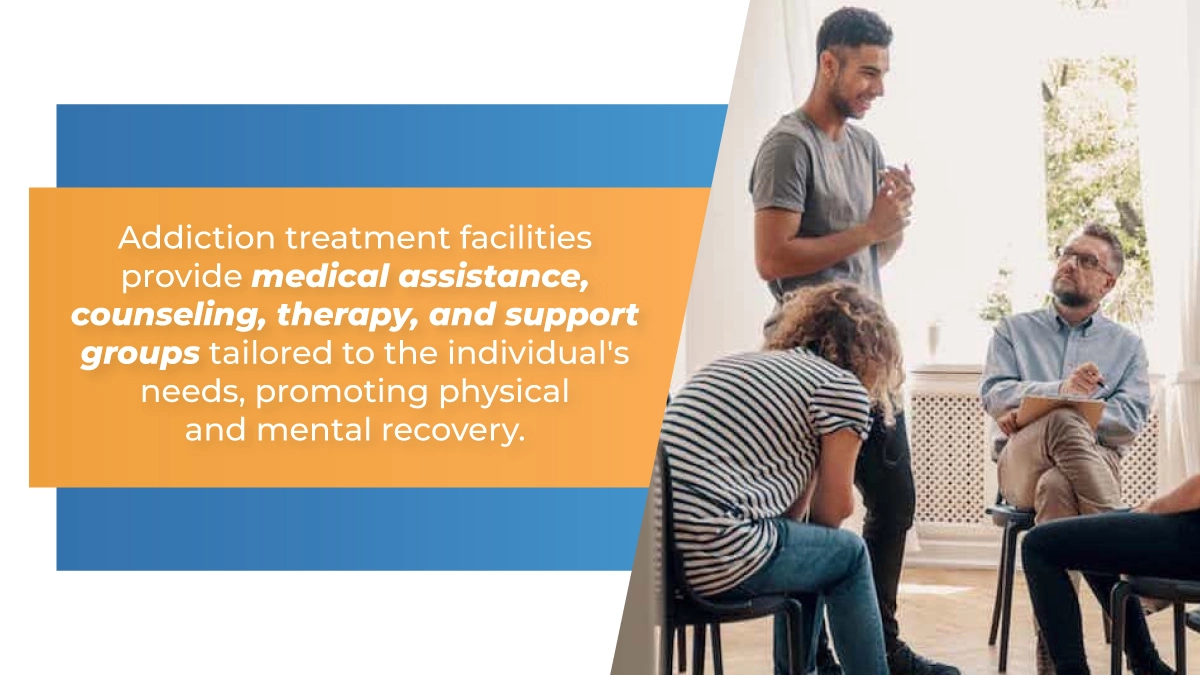
Effectiveness Of Medication-Assisted Treatment
Explore the effectiveness of medication-assisted treatment with The Recovery Team-Newton.

Every day, individuals struggling with addiction find themselves entangled with the law, often leading them to jail. However, jail time can sometimes make their situation worse. Without access to proper treatment and support, many individuals return to drugs upon release.
So, what’s the solution? Rehab it is. In rehab, individuals receive the appropriate treatment and support to overcome addiction and pave the way for a brighter future. Let’s delve into reasons why rehab is a better option than jail for those battling drug abuse and addiction.
Individuals struggling with addiction often end up in jail, but rehab is a more effective solution. Here is what this article talks about:
Are you struggling with drug problems? Seek professional medical care at The Recovery Team-Newton. Dial (508) 978-2772 for details!
Drug addiction, or substance use disorder (SUD), is a complex condition characterized by compulsive drug-seeking and use despite harmful consequences. It alters the brain’s structure and function, leading to profound changes in behavior and judgment. Addiction is not solely a moral failing or a lack of willpower; it is a chronic disease that requires medical intervention and ongoing management.
This issue extends far beyond individual suffering, impacting families, communities, and society as a whole. Drug addiction contributes to various public health challenges, including increased rates of infectious diseases like HIV/AIDS and hepatitis, heightened risk of mental illnesses such as depression and anxiety, and high rates of crime and violence.
Moreover, addiction places a significant burden on healthcare systems, as individuals struggling with addiction often require medical treatment for both physical and mental health issues. The economic costs associated with addiction, including healthcare expenses, lost productivity, and criminal justice system involvement, are staggering.
Addressing addiction as a public health issue involves implementing comprehensive strategies that encompass prevention, treatment, and harm reduction measures. By viewing addiction through this lens, society can better allocate resources to support individuals in overcoming addiction and mitigating the broader societal impacts of addiction.
Drug addiction is a complex issue with far-reaching consequences, often leading individuals down a path that intersects with the criminal justice system. Here’s how:
Individuals addicted to drugs often find themselves involved in the possession or sale of illicit substances. They may carry drugs for personal use or distribute them to others, both of which are illegal activities. Law enforcement officers actively pursue individuals caught with different types of drugs, leading to their arrest and subsequent imprisonment.
The grip of drug addiction can drive individuals to desperate measures to feed their habit. This often includes resorting to criminal activities such as theft, burglary, or robbery to obtain money for drugs. Unfortunately, these actions frequently result in arrests and subsequent incarceration as law enforcement agencies crack down on drug crimes.
The influence of drugs can significantly alter an individual’s behavior, leading to increased aggression and disorderly conduct. In the throes of addiction, individuals may become prone to violent outbursts or engage in disruptive behavior in public spaces. Such actions can prompt law enforcement intervention, leading to arrest and imprisonment for those involved.
Driving while under the influence of drugs is a dangerous and illegal activity that poses significant risks to both the driver and others on the road. Impaired judgment and reduced reaction times increase the likelihood of accidents, injuries, or fatalities. Individuals caught driving under the influence of drugs face serious legal consequences, including arrest and imprisonment.
Individuals on probation or parole are subject to specific terms and conditions set by the court or parole board, often including requirements to abstain from drug use. Unfortunately, the grip of addiction can make it challenging for individuals to comply with these terms. Violating probation or parole by failing drug tests or engaging in other prohibited behaviors can result in arrest and imprisonment.
Drug addiction can impair judgment and neglect responsibilities, including the care of children. Individuals struggling with addiction may expose children to drugs, unsafe environments, or neglect their basic needs. As a result, they may face charges of child endangerment, which can lead to imprisonment as authorities prioritize the safety and well-being of vulnerable children.
While jail or imprisonment is often seen as a solution to drug-related crimes, it may not be the most effective way to address drug addiction. Alternative approaches, such as drug courts, diversion programs, and community-based treatment initiatives, focus on rehabilitation rather than punishment.
When it comes to dealing with drug addiction, sending individuals to rehab instead of jail is a far more effective and humane approach. Here are several reasons why:
Treatment facilities prioritize the health and well-being of individuals struggling with addiction. Instead of punishment, they provide medical assistance, counseling, therapy, and support groups tailored to the individual’s needs, promoting physical and mental recovery.
Rehabilitation programs are designed to provide long-term solutions for drug addiction. By addressing the root causes of addiction and teaching coping mechanisms, individuals are better equipped to maintain sobriety even after they leave the program.
Drug addiction often stems from underlying issues such as trauma, mental health disorders, or socioeconomic factors. Rehabilitative programs offer comprehensive support to address these issues, helping individuals break free from the cycle of addiction.
By tackling the root causes of addiction and providing ongoing support, rehab significantly reduces the likelihood of individuals relapsing into criminal behavior. This helps break the cycle of recidivism and promotes rehabilitation over punishment.
Drug and alcohol treatment center equips individuals with the skills and resources they need to reintegrate into society successfully. From job training to housing assistance, rehab programs support people with an addiction in rebuilding their lives and becoming productive members of their communities.
Investing in rehab is not just morally right but also economically sensible. The costs associated with incarceration far outweigh those of rehabilitation, especially when considering the long-term benefits of reducing crime and improving public health.
Choosing rehab over punishment reflects a compassionate and humanitarian approach to addressing addiction. It recognizes that addiction is a complex issue that requires support and understanding rather than simply locking individuals away.
By addressing addiction through rehab, communities become safer as individuals are less likely to engage in drug-related crimes. In addition, rehabilitated individuals are more likely to contribute positively to their communities.
Overcrowded jails strain resources and fail to address the root causes of criminal behavior. By diverting non-violent drug offenders to rehab programs, we can alleviate pressure on the criminal justice system and ensure that those who truly pose a threat to society are prioritized.
Treating addiction as a public health issue rather than a criminal one has far-reaching benefits for society. By providing access to treatment services and support, we can reduce the spread of diseases associated with drug use, such as HIV and hepatitis, and improve overall community health.
Overall, rehab offers a more practical approach to addressing active substance use disorder (SUD), focusing on recovery rather than punishment.
When it comes to breaking free from substance use disorder (SUD), two primary types of drug rehab programs offer tailored approaches to meet individual needs.
Also known as residential treatment, this program requires individuals to reside at the rehabilitation facility for a specified period, typically from 28 days to several months. Inpatient rehab offers intensive therapy, medical support, and a structured environment to help individuals focus solely on their recovery.
Outpatient rehab programs allow patients to get treatment while living at home and attending therapy sessions and treatment programs during the day. This treatment option best suits those with mild to moderate addiction or those who have completed an inpatient treatment program and require ongoing support.
Both treatment options provide valuable resources and support. Choosing the right type of program depends on individual needs, preferences, and circumstances.
Are you or any of your family members feeling overwhelmed by substance use? You’re not alone. The Recovery Team-Newton is here to help you regain control of your life.
Our day drug treatment program provides a safe environment for individuals seeking to overcome drug and alcohol addiction. Whether you require intensive or less intensive support, we tailor our program to meet your needs.
From medication-assisted treatment (MAT) to evidence-based therapies, dual diagnosis support, and holistic approaches, we’re committed to providing you with the tools and resources necessary for your recovery journey.
Don’t wait any longer to seek the help you deserve. Call us today at (508) 978-2772 to begin your journey toward recovery.
Prisons often fail to rehabilitate those with addiction because they lack tailored treatment programs. Inmates may not receive proper support for overcoming substance abuse issues. Additionally, limited access to therapy and counseling makes it hard for individuals to address the underlying causes of addiction.
Without proper assistance, many leave prison without the tools needed to stay sober, leading to a cycle of reoffending. Rehabilitation requires personalized care and continuous support, which is often lacking within the prison system. This makes it difficult for individuals to break free from addiction and reintegrate into society.
In the United States, approximately 360,000 people are imprisoned primarily due to drug-related offenses. These individuals have been arrested and sentenced for crimes related to drug possession, distribution, or trafficking. Drug offenses account for a significant portion of the inmate population in federal and state prisons across the country.
This high prison population reflects the ongoing challenges associated with drug addiction and the criminal justice system’s approach to addressing substance abuse. As a result, many advocates call for reforms in drug policies and greater emphasis on rehabilitation rather than incarceration.
Drug rehab tends to offer better outcomes than jail for individuals struggling with substance abuse. Rehab focuses on addressing the root causes of addiction by providing therapy, support, and tools for recovery. It emphasizes rehab rather than punishment, promoting long-term sobriety and reducing recidivism.
In contrast, jail often exacerbates addiction issues, lacking specialized substance abuse treatment and support. While both approaches aim at addressing drug-related offenses, rehab prioritizes healing and reintegration into society, offering a more effective and humane solution for individuals battling addiction.

Explore the effectiveness of medication-assisted treatment with The Recovery Team-Newton.

Explore the examples of dual diagnosis and its treatment plans for better outcomes with The Recovery Team-Newton.

Explore how long drug rehab programs are with the complete guide from The Recovery Team-Newton.